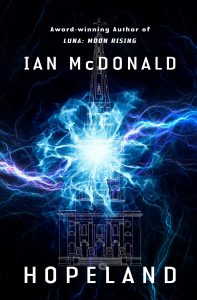Ian Mond Reviews Hopeland by Ian McDonald
 Hopeland, Ian McDonald (Tor 978-0-76537-555-1, $28.99, 512pp, hc) February 2023.
Hopeland, Ian McDonald (Tor 978-0-76537-555-1, $28.99, 512pp, hc) February 2023.
Ian McDonald’s Hopeland has been 23 years in the making. In a 2014 interview conducted by Locus, McDonald mentioned coming across the idea for Hopeland – a family structure that would last for ten thousand years – in a magazine article he read in 2000. During that same interview, McDonald spoke about his forthcoming novel Luna, which at that point was planned as the first book in a duology. Things change. Ideas percolate. Duologies evolve into trilogies and two-decade-old concepts finally, eventually, see fruition – though shaped into something more substantial, noisier, and layered than was likely first conceived.
The first hundred pages of Hopeland are a dizzying rush of quirky characters, New Age ideas, crackling Tesla coils, and eccentric families. We, along with Amon Brightbourne, are dropped in the middle of the 2011 London riots, an event I had forgotten entirely (my memory overwhelmed by so much recent horrible history), but which McDonald brings to vivid life.
Flames roar from the shattered windows of a Brixton Foot Locker. White skeletons of torched Citroens and Toyotas lie broken along Wood Green Lane…. The Turks of Turnpike Lanes, baseball bats ready, form a phalanx between their shops, their cafés, their livelihoods and the voiceless roar of street-rage.
Amon, a tweed aficionado, has come to London to perform his bespoke brand of music at a club. Instead, and amongst all the tumult, ‘‘love falls from the summer sky” in the form of Raisa Peri Antares Hopeland. She is parkour-ing her way across the rooftops of London, in a race against her ‘‘kynnd” Finn, in a bid to claim her inheritance as the ‘‘Arcmage of the Great [Tesla] Coil of Soho.” A besotted Amon decides to help Raisa (without her knowledge) by interfering with Finn’s run. Raisa wins the race, becomes the Arcmage, and falls in love with Amon, introducing him to Hopeland: a family linked by stars that will endure for ten millennia. Amon returns the favour, inviting Raisa to the sprawling mansion of Brightbourne, where she learns that the Hopelands don’t have a monopoly on peculiar families. Raisa is shown the ‘‘Music,” a Rube Goldberg-like contraption that distorts time and plays a complex, intricate tune that will take millennia to complete. She both witnesses and is told about the ‘‘Brilliant Boy,” Brightbourne’s resident ghost that proffers the firstborn son of the family (Amon) with Grace – an unfailing amount of luck. The latter will play a significant role in Amon and Raisa’s relationship. After a night of sex in the gardens of Brightbourne (an encounter that will result in a child), Raisa is made aware that the Grace has a price: the misfortune of those who encounter Amon.
The Neil Gaiman-ish quality of the first section of Hopeland is no accident. Returning to the 2014 interview, McDonald speaks about the book being ‘‘the science fictional equivalent of the kind of thing Neil Gaiman does with fantasy.” As such, the narrative is sprinkled with spatial anomalies; time jumps; massive Tesla coils hidden in London; and Emanations (Gods) that can be seen in the reflection of a small, twirling mirror. But the moment Raisa leaves Brightbourne, horrified by the truth regarding Amon, and takes a boat to Iceland, those Neil Gaiman attributes aren’t so much as forgotten as sidelined (though the Grace continues to play a critical part in proceedings). It does have me speculating whether Hopeland’s long gestation period saw McDonald take a different tack, one less about Tesla coils, ghosts, and rifts in reality.
I quickly came to terms with the shift in tone and structure. Partly because McDonald’s prose is so urgent you can’t help but be tugged along, but mostly because what follows is more exciting and chewier than what precedes it. The narrative splits. Raisa, as stated, heads to Iceland. There she joins a tiny commune of Hopelanders (ostensibly two elderly Aunties), raises her child Atli (who, like all Hopeland children, chooses their gender), and, over two decades, establishes a multinational corporation seeking to decarbonise the planet. A heartbroken Amon, having drifted from country to country, ends up on the fictional Polynesian island of Ava’u (the symbolic birthplace of the Hopeland family structure) and becomes embroiled in a Palace coup. I am deliberately leaving out a great deal. Despite being over five hundred pages long, Hopeland is a novel crammed with spectacle.
Hopeland is a story about how family, whether bound by blood or 19th-century views on Utopia, shapes the people we become – even if we reject that family. But what ultimately emerges is a heartrending love story brought into focus by the devastating effects of the Anthropocene and the geopolitical response to climate refugees. The description of a catastrophic tropical cyclone (’’She is a thing of darkness. She fills the universe…. A curtain wall of boiling cloud glows with lightnings”) is as beautiful as it is horrific. Likewise, the novel’s climax features an extended, astonishing, and nerve-racking set piece where a nation of climate refugees face extinction from an unstable environment, both ecological and political. It’s that final section of Hopeland – coupled with McDonald’s emotionally charged prose working on overdrive – that makes this such an important book. Much like the storms that blaze through the narrative, it’s McDonald’s ability to harness the elemental forces of science fiction to prophesise and speculate about how we might tackle the threats that face our species that elevates Hopeland beyond its initial quirky trappings.
Ian Mond loves to talk about books. For eight years he co-hosted a book podcast, The Writer and the Critic, with Kirstyn McDermott. Recently he has revived his blog, The Hysterical Hamster, and is again posting mostly vulgar reviews on an eclectic range of literary and genre novels. You can also follow Ian on Twitter (@Mondyboy) or contact him at mondyboy74@gmail.com.
This review and more like it in the March 2023 issue of Locus.
 While you are here, please take a moment to support Locus with a one-time or recurring donation. We rely on reader donations to keep the magazine and site going, and would like to keep the site paywall free, but WE NEED YOUR FINANCIAL SUPPORT to continue quality coverage of the science fiction and fantasy field.
While you are here, please take a moment to support Locus with a one-time or recurring donation. We rely on reader donations to keep the magazine and site going, and would like to keep the site paywall free, but WE NEED YOUR FINANCIAL SUPPORT to continue quality coverage of the science fiction and fantasy field.
©Locus Magazine. Copyrighted material may not be republished without permission of LSFF.






